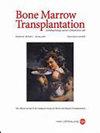达拉单抗在异基因造血干细胞移植后并发症中的作用:一项关于PRCA和AIHA的单中心前瞻性研究。
IF 4.5
2区 医学
Q1 HEMATOLOGY
引用次数: 0
摘要
造血干细胞移植(HSCT)后纯红细胞再生不良(PRCA)和自身免疫性溶血性贫血(AIHA)是一种尚未得到满足的医疗需求,目前尚无既定的治疗标准,严重影响了患者的生活质量,也给临床医生带来了挑战。与之前的药物相比,抗CD38 IgG-kappa达拉单抗似乎是一种安全有效的治疗方法。我们的研究是一项前瞻性单中心调查,评估了达拉单抗在异体造血干细胞移植后并发症中的应用。在此,我们介绍了对六名中位年龄为 65 岁的患者的治疗经验。除一名患者因 GVHD 恶化期间的败血症而死亡外,所有接受治疗的患者在使用促红细胞生成素悬液后都达到了输血独立。移植物功能不佳仍然是临床医生面临的一项管理挑战,对患者的生活质量有很大影响。目前,针对PRCA和最不常见的AIHA的治疗方案似乎效果不佳,因此很难满足移植后患者的不同需求。虽然我们的数据和以前的文献报道都是初步的,但 daratumumab 促使我们进一步思考它在这种患者中的应用。本文章由计算机程序翻译,如有差异,请以英文原文为准。
The role of daratumumab in complications post-allogeneic hematopoietic stem cell transplantation: a single-center prospective study on PRCA and AIHA
Pure red cell aplasia (PRCA) and autoimmune hemolytic anemia (AIHA) post-hematopoietic stem cell transplantation (HSCT) are an unmet medical need with no established standard of care, significantly affecting the patient quality of life and posing a challenge for clinicians. The anti-CD38 IgG-kappa Daratumumab appears to be a safe and efficace treatment compared to prior drugs. Our study is a prospective monocentric investigation assessing the use of daratumumab in these complications following allo-HSCT. Here we describe our experience on six patients with a median age of 65 years. All treated patients, except one, who died because of sepsis during GVHD exacerbation, reached transfusion independence with erythropoietin suspension. Poor graft function remains a management challenge for clinicians and has a significant impact on the patient’s quality of life. Currently, therapeutic options for PRCA and for the least common AIHA, appear ineffective, making it difficult to address the diverse needs of post-transplant patients. Although our data and those previously reported in the literature are preliminary, daratumumab prompts further reflection on its use in this setting of patients.
求助全文
通过发布文献求助,成功后即可免费获取论文全文。
去求助
来源期刊

Bone Marrow Transplantation
医学-免疫学
CiteScore
8.40
自引率
8.30%
发文量
337
审稿时长
6 months
期刊介绍:
Bone Marrow Transplantation publishes high quality, peer reviewed original research that addresses all aspects of basic biology and clinical use of haemopoietic stem cell transplantation.
The broad scope of the journal thus encompasses topics such as stem cell biology, e.g., kinetics and cytokine control, transplantation immunology e.g., HLA and matching techniques, translational research, and clinical results of specific transplant protocols. Bone Marrow Transplantation publishes 24 issues a year.
 求助内容:
求助内容: 应助结果提醒方式:
应助结果提醒方式:


